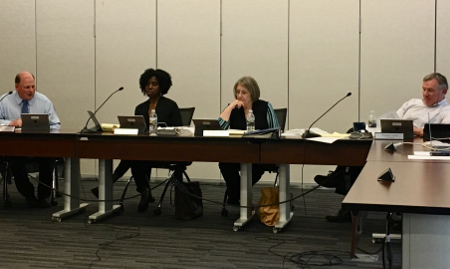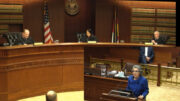By Jeffrey A. Roberts
CFOIC Executive Director
With little discussion in public, the Colorado Independent Ethics Commission (IEC) this week formally enacted records access rules that mostly mirror the Colorado Open Records Act but also assert the commission’s authority to “adopt a public records policy that deviates from CORA.”
The commissioners approved the rules Monday despite objections raised in a letter from the Colorado Press Association, the Colorado Broadcasters Association and the Colorado Freedom of Information Coalition.
“There is absolutely no reason that the IEC should not be subject to the FULL Colorado Open Records Act,” the three organizations wrote. “Absent a court decision expressly finding that the IEC is not an entity covered by the CORA, we believe the IEC is subject to CORA.”

The Colorado Independent Ethics Commission at its May 7 meeting.
The ethics commission, which investigates allegations of ethical misconduct involving public officials, considered itself subject to CORA until sometime after it moved to the Colorado judicial department in 2010. Because CORA does not cover the judicial branch’s administrative records, the IEC determined that it could write its own rules of public access to records.
The initial draft, proposed at the end of last year, was substantially different from the state’s open records law and more restrictive in some ways. Critics of the proposal argued that the commission was overstepping its authority. “You don’t get to just come up with your own rules that conflict with CORA,” wrote Troy Bratton, who until recently was legal and policy manager for the secretary of state’s office.
The commission rewrote the proposed rules after receiving public comments, condensing a 10-page document into a single page that “incorporates by reference and expressly adopts the provisions of CORA” but with three differences.
One prohibits the commission from disclosing a draft or record of an investigation that has not been provided to the parties involved in a case, as well as “work product including advisory or deliberative materials.” Another allows the commission to withhold records that might relate to a frivolous complaint or a complaint that has not yet been deemed non-frivolous. A third difference allows the commission to raise any issue in defending against a petition for a court order permitting inspection of a record.
The rules also state that the commission “is not a state agency” and, therefore, not subject to CORA.
CFOIC and the press and broadcasters associations still voiced concerns about the revised proposal, noting in new written comments that “the fact that IEC is housed in a judicial branch building does not exempt it from CORA, and the judicial branch’s own rule governing access to that branch’s administrative records makes that abundantly clear.”
At Monday’s meeting, Commissioner Jo Ann Sorensen said the letter did not change her support for the records rules. “I’m not persuaded by this comment that we should change our actions,” she said.
“I think we’ve spent a lot of time,” added Commissioner Matt Smith, “and I think we have a sound basis for adoption of the rule.”
Follow the Colorado Freedom of Information Coalition on Twitter @CoFOIC. Like CFOIC’s Facebook page. Do you appreciate the information and resources provided by CFOIC? Please consider making a tax-deductible donation.




